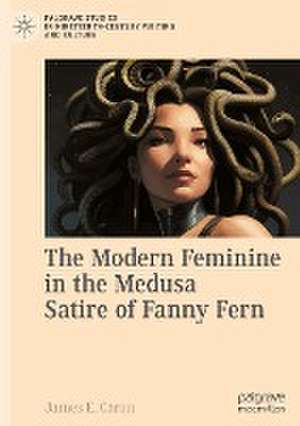The Modern Feminine in the Medusa Satire of Fanny Fern: Palgrave Studies in Nineteenth-Century Writing and Culture
Autor James E. Caronen Limba Engleză Hardback – 3 ian 2024
Din seria Palgrave Studies in Nineteenth-Century Writing and Culture
- 15%
 Preț: 584.43 lei
Preț: 584.43 lei - 20%
 Preț: 691.57 lei
Preț: 691.57 lei - 15%
 Preț: 646.30 lei
Preț: 646.30 lei -
 Preț: 390.63 lei
Preț: 390.63 lei -
 Preț: 390.63 lei
Preț: 390.63 lei - 15%
 Preț: 526.18 lei
Preț: 526.18 lei -
 Preț: 389.11 lei
Preț: 389.11 lei -
 Preț: 390.63 lei
Preț: 390.63 lei -
 Preț: 384.70 lei
Preț: 384.70 lei -
 Preț: 388.72 lei
Preț: 388.72 lei -
 Preț: 388.72 lei
Preț: 388.72 lei -
 Preț: 388.72 lei
Preț: 388.72 lei -
 Preț: 390.63 lei
Preț: 390.63 lei -
 Preț: 389.31 lei
Preț: 389.31 lei -
 Preț: 388.72 lei
Preț: 388.72 lei - 15%
 Preț: 700.75 lei
Preț: 700.75 lei - 18%
 Preț: 731.10 lei
Preț: 731.10 lei -
 Preț: 387.75 lei
Preț: 387.75 lei - 15%
 Preț: 651.51 lei
Preț: 651.51 lei -
 Preț: 390.63 lei
Preț: 390.63 lei -
 Preț: 390.63 lei
Preț: 390.63 lei -
 Preț: 386.81 lei
Preț: 386.81 lei -
 Preț: 387.75 lei
Preț: 387.75 lei -
 Preț: 392.97 lei
Preț: 392.97 lei -
 Preț: 389.11 lei
Preț: 389.11 lei -
 Preț: 389.88 lei
Preț: 389.88 lei - 15%
 Preț: 641.71 lei
Preț: 641.71 lei -
 Preț: 386.61 lei
Preț: 386.61 lei - 15%
 Preț: 584.43 lei
Preț: 584.43 lei -
 Preț: 392.60 lei
Preț: 392.60 lei -
 Preț: 390.84 lei
Preț: 390.84 lei - 15%
 Preț: 642.36 lei
Preț: 642.36 lei - 15%
 Preț: 582.80 lei
Preț: 582.80 lei - 15%
 Preț: 639.25 lei
Preț: 639.25 lei -
 Preț: 388.72 lei
Preț: 388.72 lei -
 Preț: 387.20 lei
Preț: 387.20 lei - 15%
 Preț: 642.51 lei
Preț: 642.51 lei -
 Preț: 384.31 lei
Preț: 384.31 lei -
 Preț: 387.75 lei
Preț: 387.75 lei -
 Preț: 389.70 lei
Preț: 389.70 lei -
 Preț: 386.81 lei
Preț: 386.81 lei
Preț: 697.15 lei
Preț vechi: 820.18 lei
-15% Nou
Puncte Express: 1046
Preț estimativ în valută:
133.41€ • 138.44$ • 111.51£
133.41€ • 138.44$ • 111.51£
Carte tipărită la comandă
Livrare economică 18 martie-01 aprilie
Preluare comenzi: 021 569.72.76
Specificații
ISBN-13: 9783031412752
ISBN-10: 3031412753
Pagini: 217
Ilustrații: XIII, 217 p. 1 illus.
Dimensiuni: 148 x 210 mm
Greutate: 0.43 kg
Ediția:1st ed. 2024
Editura: Springer International Publishing
Colecția Palgrave Macmillan
Seria Palgrave Studies in Nineteenth-Century Writing and Culture
Locul publicării:Cham, Switzerland
ISBN-10: 3031412753
Pagini: 217
Ilustrații: XIII, 217 p. 1 illus.
Dimensiuni: 148 x 210 mm
Greutate: 0.43 kg
Ediția:1st ed. 2024
Editura: Springer International Publishing
Colecția Palgrave Macmillan
Seria Palgrave Studies in Nineteenth-Century Writing and Culture
Locul publicării:Cham, Switzerland
Cuprins
1 Introduction: Fanny Fern and the Mob of Scribbling Women.- 2 Sara Payson Willis Parton’s (Comic) Preacher, Fanny Fern.- 3. The Satirist and Her Public.- 4 Satirizing Gender Expectations: Fanny Fern as the Impossible Subject.- 5 Creating Comic Community: Scathing Epithets, Caricature, and Comic Violence.- 6 Constructing Fanny Fern as Satirist.- 7 Fanny Fern’s Significance in the American Comic Tradition.
Notă biografică
James E. Caron is Professor Emeritus, University of Hawaiʽi at Mānoa. In addition to publishing many articles on comic writers and comic artifacts, he has authored Satire as the Comic Public Sphere: Postmodern “Truthiness” and Civic Engagement (2021), and Mark Twain, Unsanctified Newspaper Reporter (2008), as well as co-edited essays on Charlie Chaplin in Refocusing Chaplin: A Screen Icon in Critical Contexts (2013).
Textul de pe ultima copertă
The Modern Feminine in the Medusa Satire of Fanny Fern argues that Sara Parton and her literary alter ego, Fanny Fern, occupy a star-power position within the antebellum literary marketplace dominated by women authors of sentimental fiction, writers Nathaniel Hawthorne (in)famously called “the damn mob of scribbling women.” The Fanny Fern persona represents a nineteenth-century woman voicing the modern feminine within a laughter-provoking bourgeois carnival, a forerunner of Hélène Cixous’s laughing Medusa figure and her theory about écriture féminine. By advancing an innovative theory about an Anglo-American aesthetic, comic belles lettres, Caron explains the comic nuances of Parton’s persona, capable of both an amiable and a caustic satire. The book traces Parton’s burgeoning celebrity, analyzes her satires on cultural expectations of gendered behavior, and provides a close look at her variegated comic style. The book then makes two first-order conclusions: Parton not only offers a unique profile for antebellum women comic writers, but her Fanny Fern persona also anchors a potential genealogy of women comic writers and activists, down to the present day, who could fit Kate Clinton’s concept of fumerism, a feminist style of humor that fumes, that embraces the comic power of a Medusa satire.
Caracteristici
Understands Sara Parton as a symbolic origin for a genealogy of feminist satirists Draws on theories about comic artifacts and American empire in a transnational context Examines Sara Parton’s early newspaper writings as well as many uncollected items
